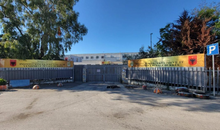
 Flash News
Flash News
Drenova prison police officer arrested for bringing drugs and illegal items into cell
Lavrov: NATO is risking self-destruction with new military budget
Kurti and Vučić "face off" tomorrow in Skopje
Construction worker dies after falling from scaffolding in Berat
The prosecution sends two Korça Municipality officials to trial
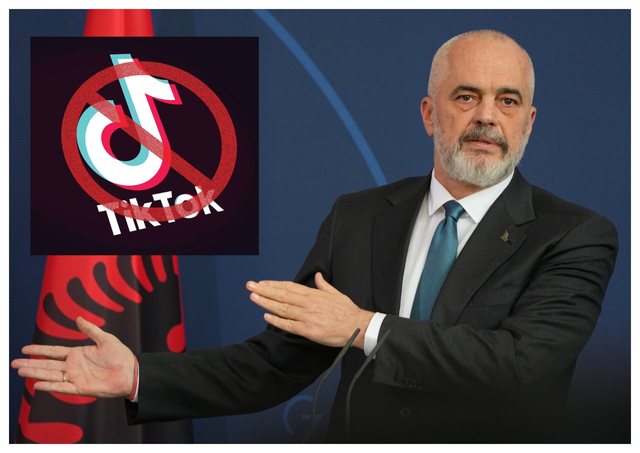
Internet providers in Albania were ordered to block TikTok on March 13, following a government decision to impose a year-long ban – but the mobile version of the app continued to work for some users on Friday.
However, TikTok has not been accessible on its web version since the ban was imposed, prompting criticism from media freedom organizations.
The National Authority for Cybersecurity stated that on March 13, it had requested internet providers to take the necessary measures to block access to the TikTok application and its digital infrastructure on Albanian territory.
According to the authority, the ban will be technically implemented through blocking TikTok's IPs (internet protocol) in Albania, blocking TikTok's DNSs (domain name system) in Albania, blocking TikTok's SNIs (server name indexes) in Albania, and blocking the IPs of the company that owns the platform, ByteDance, in Albania.
Internet service providers were ordered to send a written confirmation to the Electronic and Postal Communications Authority and the National Cybersecurity Authority that they had closed access to the relevant IPs and domains by March 13.
Orkidea Xhaferraj, an expert at the Center for Science and Innovation for Development, told BIRN that "there is very little public information on the technical measures being taken regarding the interruption of access to the TikTok platform."
"In response to our request for information, the National Cyber Security Authority clarified that DNS, IP and SNI filtering methods are being used - information which has also been made public by online media," said Xhaferraj.
"Filtering SNIs on a national scale takes more time to technically implement and may require the use of certain hardware and software solutions," she added.
Xhaferraj stressed that it is important that this process be transparent, "given that the decision to block access to TikTok in Albania affects citizens' digital rights, freedom of expression and access to information."
Prime Minister Edi Rama first proposed the ban in December, a month after the stabbing death of a 14-year-old, following a series of conflicts on social media.
According to Politico, after the murder, several TikTok videos showed young people expressing support for the perpetrator. However, TikTok told BIRN that there was no evidence that the perpetrator or the victim had TikTok accounts. The platform said that reports suggest that the videos about the incident were posted on another social network and not on TikTok.
The socialist prime minister, in power since 2013, insisted that the decision was not "hasty" but was based on a survey of around 65,000 parents, 90 percent of whom had called for TikTok to be shut down.
The decision to impose the ban has been seen by some as a populist move ahead of Albania's May elections. It has been criticized by opposition parties, which organized a protest against the ban on March 15 in Tirana.
Daniel Prroni, a researcher at the Institute for Democracy and Mediation, told BIRN that "closing TikTok does not resolve concerns about social networks, but may deepen them."
"The most sustainable solution is alignment with the EU Digital Services Act, which strengthens users' rights and establishes clear rules for content moderation. Institutions should focus efforts in this direction," Prroni said.
Two European media freedom organizations, Safe Journalists Network and Media Freedom Rapid Response, expressed "serious concern" about the Albanian government's decision.
“We emphasize that the total ban of a platform constitutes an extreme restriction of the right to freedom of expression and access to information. The complete ban of a platform violates proportionality, affecting the legitimate expression of all users and limiting public debate and access to diverse sources of information,” their statement said.
“Alternative targeted solutions, such as strong content moderation, age verification, and advanced user education programs, should have been fully explored before imposing a total ban. Naturally, the blanket measure sets a dangerous precedent for excessive state interference in digital rights,” they added.
The Chinese video-sharing platform is extremely popular in Albania, with 1.53 million users over the age of 18 as of the beginning of 2024, according to data from parent company ByteDance. Albania has a population of 2.4 million. Reporter.al
Latest news



Second hearing on the protected areas law, Zhupa: Unconstitutional and dangerous
2025-06-30 22:18:46



Israel-Iran conflict, Bushati: Albanians should be concerned
2025-06-30 21:32:42

Fuga: Journalism in Albania today in severe crisis
2025-06-30 21:07:11
"There is no room for panic"/ Moore: Serbia does not dare to attack Kosovo!
2025-06-30 20:49:53

Temperatures above 40 degrees, France closes nuclear plants and schools
2025-06-30 20:28:42
Lavrov: NATO is risking self-destruction with new military budget
2025-06-30 20:13:54
Turkey against the "Bektashi state" in Albania: Give up this idea!
2025-06-30 20:03:24

Accused of sexual abuse, producer Diddy awaits court decision
2025-06-30 19:40:44



Kurti and Vučić "face off" tomorrow in Skopje
2025-06-30 18:44:12
Tourism: new season, old problems
2025-06-30 18:27:23


Construction worker dies after falling from scaffolding in Berat
2025-06-30 17:51:44




Almost free housing: East Germany against depopulation
2025-06-30 16:43:06

Hamas says nearly 60 people killed in Gaza as Trump calls for ceasefire
2025-06-30 16:14:15
Drownings on beaches/ Expert Softa: Negligence and incompetence by institutions!
2025-06-30 16:00:03


European ports are overloaded due to Trump tariffs
2025-06-30 15:30:44
The prosecution sends two Korça Municipality officials to trial
2025-06-30 15:19:54

Lezha/ Police impose 3165 administrative measures, handcuff 19 drivers
2025-06-30 14:55:04
Young people leave Albania in search of a more sustainable future
2025-06-30 14:47:52
Record-breaking summer, health threats and preventive measures
2025-06-30 14:36:19


Constitution of the Parliament, Osmani invites political leaders to a meeting
2025-06-30 14:07:54

Heat wave 'invades' Europe, Spain records temperatures up to 46 degrees Celsius
2025-06-30 13:42:02
Accident in Vlora, car hits 2 tourists
2025-06-30 13:32:16

Kurti confirms participation in today's official dinner in Skopje
2025-06-30 13:03:27

Fight between 4 minors in Kosovo, one of them injured with a knife
2025-06-30 12:38:45

Report: Teenage girls the loneliest in the world
2025-06-30 12:20:40
Commissioner Kos and Balkan leaders meet in Skopje on Growth Plan
2025-06-30 12:07:59
Wanted by Italy, member of a criminal organization captured in Fier
2025-06-30 11:55:53
Hundreds of families displaced by wave of Israeli airstrikes in Gaza
2025-06-30 11:45:17
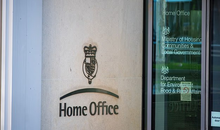
Zenel Beshi: The criminal who even 50 convictions won't move from Britain
2025-06-30 11:23:19
A new variant of Covid will circulate during the summer, here are the symptoms
2025-06-30 11:14:58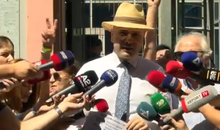

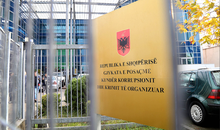
"Partizani" case, trial postponed to July 21 at the Special Court
2025-06-30 10:41:05
Uncontrolled desire to steal, what is kleptomania, why is it caused
2025-06-30 10:30:08
Requested change of security measure, hearing for Malltez postponed to July 7
2025-06-30 10:24:32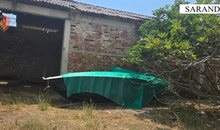
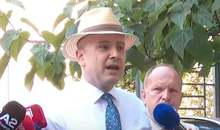

Output per working hour in Albania 35% lower than the regional average
2025-06-30 09:54:35

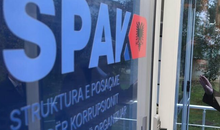
The trial for the "Partizani" file begins today
2025-06-30 09:27:57
22 fires in the last 24 hours in the country, 2 still active
2025-06-30 09:21:28
How is the media controlled? The 'Rama' case and government propaganda
2025-06-30 09:13:36
German top diplomat: Putin wants Ukraine to capitulate
2025-06-30 09:00:07
Foreign exchange, how much foreign currencies are sold and bought today
2025-06-30 08:44:38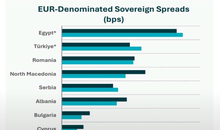
Chart/ Sovereign risk for Albania from international markets drops significantly
2025-06-30 08:26:38
Horoscope, what do the stars have in store for you?
2025-06-30 08:11:44
Clear weather and passing clouds, here is the forecast for this Monday
2025-06-30 07:59:32
Morning Post/ In 2 lines: What mattered yesterday in Albania
2025-06-30 07:47:37
Milan make official two departures in attack
2025-06-29 21:57:23
6 record tone
2025-06-29 21:30:46
4-year-old girl falls from balcony in Lezha, urgently taken to Trauma
2025-06-29 21:09:58


Assets worth 12 million euros seized from cocaine trafficking organization
2025-06-29 19:39:43
Fire in Durrës, Blushi: The state exists only on paper
2025-06-29 19:17:48

Fire endangers homes in Vlora, helicopter intervention begins
2025-06-29 18:27:51
France implements smoking ban on beaches and parks
2025-06-29 18:02:08
England U-21 beat Germany to become European champions
2025-06-29 17:42:49
Trump criticizes Israeli prosecutors over Netanyahu's corruption trial
2025-06-29 17:08:10
Street market in Durrës engulfed in flames
2025-06-29 16:52:57

UN nuclear chief: Iran could resume uranium enrichment within months
2025-06-29 16:03:24
Albanian man dies after falling from cliff while climbing mountain in Italy
2025-06-29 15:52:01

Another accident with a single-track vehicle in Tirana, a car hits a 17-year-old
2025-06-29 15:07:15
While bathing in the sea, a vacationer in Durrës dies
2025-06-29 14:54:01
Sentenced to life imprisonment, cell phone found in Laert Haxhiu's cell
2025-06-29 14:26:40
77 people detained in protest, Vučić warns of new arrests
2025-06-29 14:07:46
